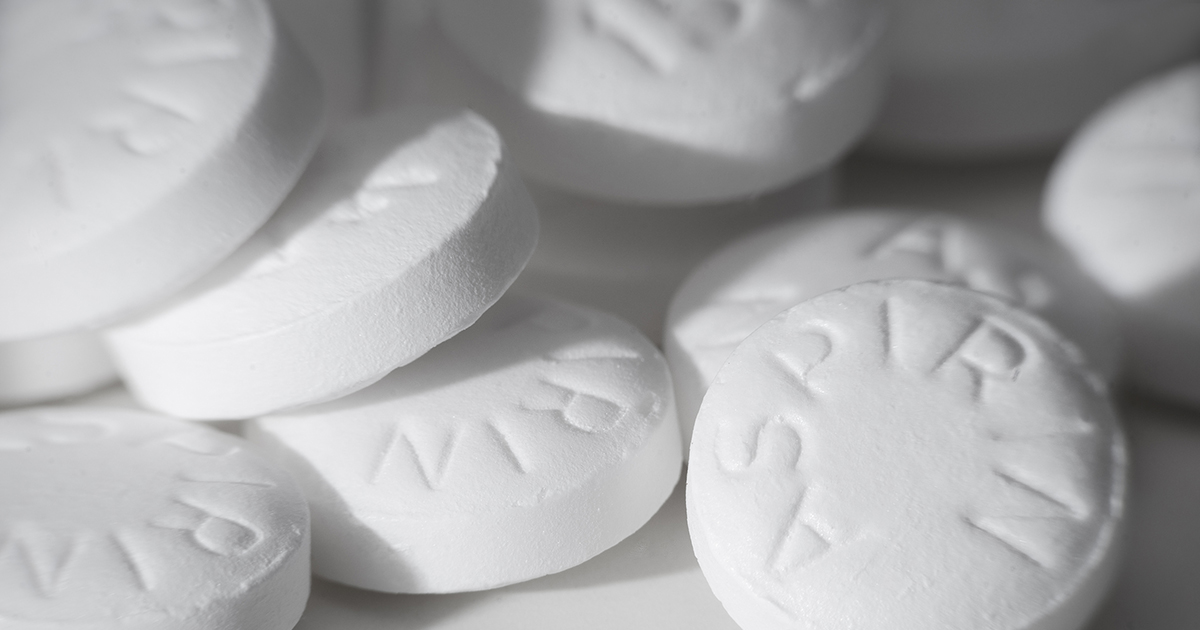
Doctors have appreciated the healing potential of aspirin for centuries. Its longevity and versatility as a pain reliever and anti-inflammatory have led some to herald it as a “miracle drug."
Aspirin is used to relieve headaches and arthritis. It helps reduce fevers and soothe toothaches. Because aspirin thins the blood, doctors may recommend it to some patients to help prevent blood clots and reduce the risk of a stroke or heart attack.
Now, evidence is mounting that an aspirin regimen may also help reduce the risk of certain cancers, especially colorectal cancer.
“Epidemiological studies have shown aspirin to reduce the incidence of formation of polyps and thus reduce the probability of developing colon cancer,” says Pankaj Vashi, MD, a Gastroenterologist and Vice Chief of Staff at City of Hope® Cancer Center Chicago. “Recent studies have shown that aspirin also has an immunologic effect, which explains why low metastatic colon cancers may be seen in patients who were on aspirin.”
Despite the studies touting aspirin’s ability to reduce cancer risk and improve heart health, not everyone is convinced.
In this article, we’ll explore:
- What is aspirin?
- How does aspirin target inflammation?
- What does the research say?
- What does the U.S. Preventive Services Task Force say?
- What are the potential side effects of aspirin use?
If you’ve been diagnosed with cancer and are interested in a second opinion on your diagnosis and treatment plan, call us or chat online with a member of our team.
What is aspirin?
Aspirin, acetylsalicylic acid (ASA), is a nonsteroidal anti-inflammatory drug, a class of medications used to reduce pain and inflammation. The drug was invented in 1897 by Dr. Felix Hoffman, but its base ingredient salicylic acid has been used for centuries to reduce fever and pain. Salicylic acid is found in willow trees, and ancient healers used willow bark and willow leaf tea to treat fevers. Salicin, an active ingredient in salicylic acid, also is found in the meadowsweet flower.
According to The Pharmaceutical Journal, the first clinical trial of salicin in 1876 found that the substance reduced fever and joint pain. Two years after Hoffman’s acetylsalicylic acid compound was developed, the Friedrich Bayer and Co. coined the name aspirin. According to the journal, “The letter ‘A’ stands for acetyl, ‘spir’ is derived from the plant known as Spiraea ulmaria (meadowsweet), which yields salicin, and ‘in’ was a common suffix used for drugs at the time of the first stable synthesis of acetylsalicylic acid.”
Aspirin is among the most commonly used drugs in the world. It’s also among the most-frequently researched drugs. That research has produced evidence that aspirin may not only reduce fever, pain and inflammation; it may also improve cardiovascular health and reduce cancer risk.
Targeting inflammation
Aspirin works by targeting enzymes known as cyclooxygenases (COX). Two types of this enzyme—COX1 and COX2—help produce substances in the body that contribute to inflammation, a common response to injury or illness.
When inflammation becomes chronic, it may cause DNA damage in cells in the inflamed area, which in turn may lead to serious diseases, such as colitis or cancer.
Long-term aspirin use may reduce the inflammation that sometimes leads to cancer. Research also shows aspirin may help limit the production of a gene called c-Myc, a "master regulator" protein that helps control cell growth and division. The c-Myc protein is considered an oncogene, which has the potential to mutate a healthy cell into a cancer cell.
What does the research say?
Research abounds in aspirin’s potential to reduce cancer risk. The latest research, published in April by scientists in Italy, suggest that “regular aspirin use may have an active role in enhancing immunosurveillance” against colorectal cancer.
“The Italian study speculates that due to an immunological effect, patients with colon cancer may have less metastatic cancer in the lymph nodes if they have been on long-term, low-dose aspirin,” Dr. Vashi says. “This still needs to be studied more before we claim ASA as a therapeutic option for colon cancer.”
In a 2016 report published in the Journal of the American Medical Association, researchers who studied aspirin use in 135,000 patients concluded "long-term aspirin use was associated with a modest but significantly reduced risk for overall cancer, especially gastrointestinal tract tumors. Regular aspirin use may prevent a substantial proportion of colorectal cancers."
Two studies in 2011 also concluded that aspirin may help reduce cancer risk. One of those studies, of patients with Lynch syndrome, an inherited condition that increases the risk of colorectal cancer, concluded that an aspirin regimen "substantially reduced cancer incidence … in carriers of hereditary colorectal cancer."
The other, a review of several studies involving more than 660,000 men and women, found "clear evidence that aspirin in doses as low as 325 mg per day reduces [colorectal cancer] risk."
What does the U.S. Preventive Services Task Force say?
While touted as a wonder drug by many, the U.S. Preventive Services Task Force (USPSTF) has a more measured approach to the drug’s benefits.
The USPSTF is an independent panel of experts convened by the government to help develop guidelines on health care issues, such as cancer screening and aspirin use. In an extensive 2022 article in the Journal of the American Medical Association (JAMA), the USPSTF altered its recommendation on using aspirin to prevent cardiovascular disease (CVD). The agency no longer recommends a daily, low-dose aspirin regimen to prevent CVD in people 60 years or older.
“The USPSTF concludes with moderate certainty that aspirin use for the primary prevention of CVD events in adults aged 40 to 59 years who have a 10 percent or greater 10-year CVD risk has a small net benefit,” the report says. “The USPSTF concludes with moderate certainty that initiating aspirin use for the primary prevention of CVD events in adults 60 years or older has no net benefit.”
The agency also backtracked on a previous recommendation on aspirin use to reduce the risk of colorectal cancer (CRC) and now has “concluded that the evidence is inadequate that low-dose aspirin use reduces CRC incidence or mortality.” But the agency says more research is needed to better evaluate aspirin’s potential to reduce CVD and CRC.
In a response to the USPSTF’s recommendations, the American Cancer Society says it “recognizes the evidence that long-term regular aspirin use has both harms and benefits, including reduced risk of colorectal cancer, but has not formally reviewed this evidence and does not currently have recommendations for or against aspirin use.”
Still, the American Heart Association and the American College of Cardiology (ACC) recommend that those at high risk of a heart attack talk to their doctor about taking low-dose aspirin to help reduce the risk of blood clots that may lead to a heart attack or stroke.
"It is very important to recognize that the USPSTF recommendation on the initiation of aspirin does not apply to patients with a prior history of heart attack, stroke, bypass surgery or recent stent procedure," says Eugene Yang, MD, chair of the ACC's Prevention of Cardiovascular Disease Section. "All patients should consult with their physicians about whether they can safely discontinue aspirin. This decision should be made after a careful review of the risks and benefits."
What are the potential side effects of aspirin use?
Before taking aspirin daily, consult your doctor. Aspirin is a powerful acid, and patients taking daily doses may develop side effects, including gastrointestinal issues and bleeding.
“ASA should not be used in patients who are high risk for gastrointestinal bleeding,” Dr. Vashi says. “Caution should be taken in patients who have stomach ulcers or who are on anticoagulants. Cancer patients who are at risk of bleeding due to low platelet counts from chemotherapy should not take ASA.”
Experts also urge parents not to give aspirin to children, and they warn nursing mothers that the drug may be passed onto babies through breast milk.
Despite the documented side effects, millions of Americans still take aspirin regularly. A University of Michigan poll found that one-quarter of Americans 50 to 80 years old take aspirin at least three times a week.
“Aspirin is no longer a one-size-fits-all preventive tool for older adults, which for decades it was touted as,” says Michigan Medicine Hematologist Jordan Schaefer, MD.
“This poll shows we have a long way to go to make sure aspirin use is consistent with current knowledge.”
If you’ve been diagnosed with cancer and are interested in a second opinion on your diagnosis and treatment plan, call us or chat online with a member of our team.

